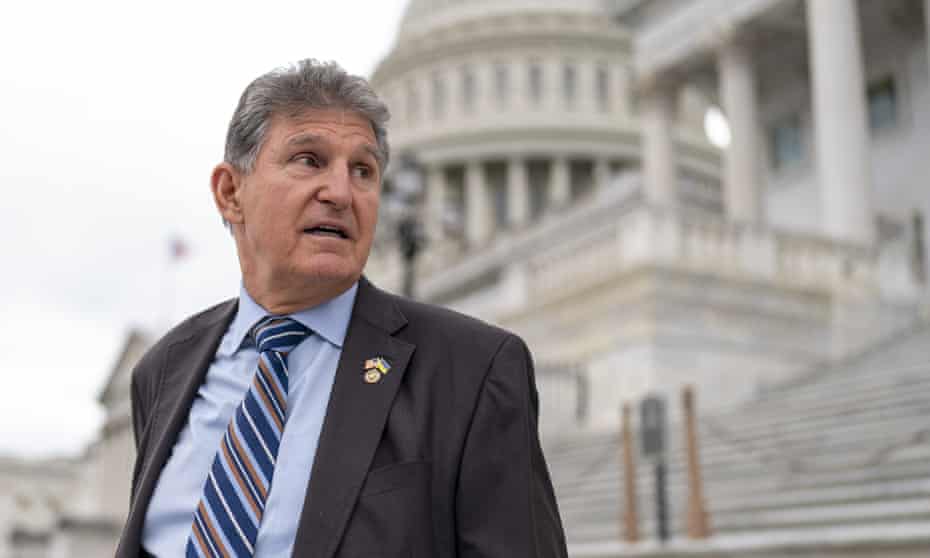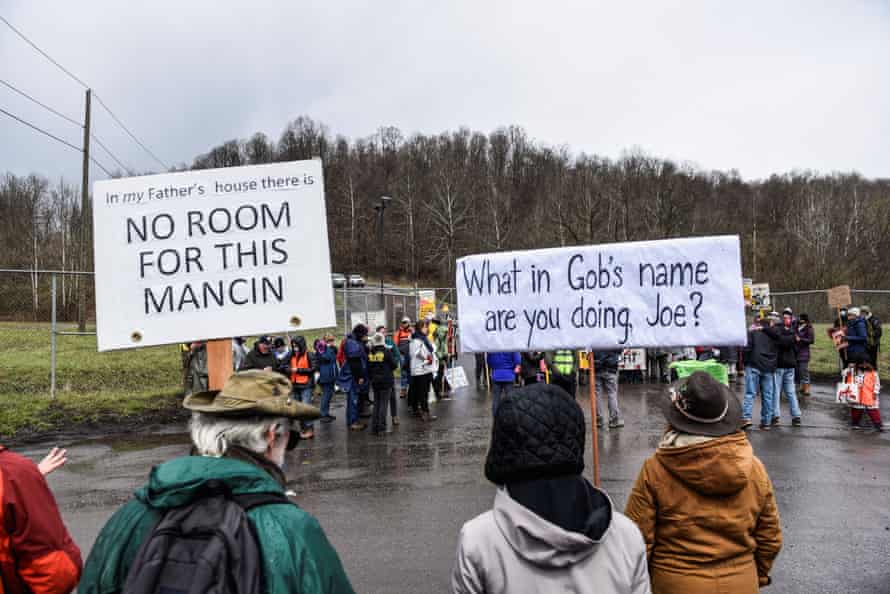Did Joe Manchin block climate action to benefit his financial interests?

"Nancy Hilsbos, a former coalminer living in the West Virginia county that Senator Joe Manchin calls home, barely noticed the nondescript office block she passed almost daily.
The property, at the top of a rise on the road out of the small city of Fairmont, bears a large sign: “Manchin Professional Building”. Nameplates announce the offices of accountants, financial advisers and insurers. But there is no mention of the most profitable and influential company registered at the address – the Democratic senator’s own firm, Enersystems.
Manchin was recently revealed to have quietly made millions of dollars from Enersystems over the past three decades as the only supplier of a low grade coal to a high-polluting power plant near Fairmont. That came as news to Hilsbos and just about everyone else in the city.
“What surprised me was that we didn’t know it. One of the most shocking things was that I’ve driven by that place thousands of times in the last 30 years and I had no idea that’s where his business operation was headquartered because there’s no sign,” said Hilsbos.
“I wonder why he’s not prouder of what he’s done. Why doesn’t he have a big sign that says Enersystems?”
In 2020, Manchin earned nearly half a million dollars from the company, and $5.6m over the previous decade.
But Hilsbos, who worked underground for 13 years and was also a union activist, is less bothered by the senator keeping the source of his wealth shielded than by what else may have been hidden from view.
For years, Manchin has justified voting against curbs on the burning of fossil fuels and other measures to tackle the climate crisis on the grounds that they were bad for West Virginia, whose economy and culture are rooted in coal mining. Last year, he used his vote in a hung US Senate to block President Biden’s $3.5tn economic plan in part because he said he was “very, very disturbed” that its climate provisions would kill the coal industry.
But after the revelations that Manchin has made what most West Virginians would regard as a fortune from the Grant Town power plant, Hilsbos was left wondering if US climate policy, and by extension the global response to the crisis, has been held hostage to the senator’s financial interests.
“If he used it to slow the responsible addressing of climate change issues then that’s an international responsibility,” she said. “What’s wrong is him throwing so much weight against the public interest when he has so much to gain by the continued existence of this kind of facility.”
Hilsbos is not alone in her concern.
Christopher Regan, a former vice-chair of the West Virginia Democratic party who worked as an aide to Manchin, recalled a time when the senator painted prominent Republican officials in the state as “involved in self-service as opposed to public service”, a line Regan then promoted.
“This thing with the coal plant turns that around on him. What’s he doing? Is this for West Virginia? Or is this just strictly for his own narrow pecuniary interest?” he said.
Regan said that’s a question that could haunt Manchin as he considers a run for re-election in two years.
Manchin founded Enersystems in 1988 with his brother, Roch, at about the time the state was considering an application to build a power plant in Grant Town, a small former mining community less than 20 minutes’ drive north of Fairmont.
Manchin, then a state senator, helped clear the way for the construction of the power plant while negotiating a deal to become the only supplier of its fuel. Not just any fuel but discarded coal known as “garbage of bituminous”, more popularly called “gob”, which is even more polluting than regular coal.
When the US Environmental Protection Agency (EPA) raised concerns that the Grant Town plant was too close to other coal burning facilities, increasing pollution levels in the area, Manchin intervened and the objections went away. Later, as his state’s governor, Manchin used his political influence to win approval for an increase in the rate charged for electricity charged by the plant, which increased bills for ordinary West Virginians. The New York Times reported that, in a highly unusual arrangement, the senator has been getting a cut of those bills.

After his election to the US Senate in 2010, Manchin sat on the energy committee, and then became its chair, from where he has blocked environmental regulations that would have hit the Grant Town plant and other gob-burning facilities. Manchin also stood in the way of Biden’s multi-trillion dollar Build Back Better plan which could have threatened the power plant with tighter federal climate regulations. The senator defended the move as necessary in the midst of the Covid crisis, economic uncertainty, and with fuel supplies threatened by Russia’s war on Ukraine.
But the suspicion remains that he was, at least in part, acting in his own interests. Hilsbos said that the first she knew about the source of Manchin’s wealth came from recent revelations in the Intercept and later the New York Times. They prompted demonstrations outside the power plant in April to demand its closure because of the additional pollution caused by gob.
Although Hilsbos said she sympathised with the protesters’ concerns, she also understood the fears of people in Grant Town, once home to the largest underground mine in the world by the amount of coal produced. The mine closed in the mid-80s, shedding hundreds of jobs. Now the power plant, with about 50 workers, is the only large private employer in a town without a gas station or convenience store.
“Some neighbours came forward and said, I’ve always hated that place. But when we went to the town council meeting and tried to explain to them why people were coming from everywhere to demonstrate here, they said, ‘We don’t want you here, don’t come,’” said Hilsbos.
“A lot of the people involved in the town council have worked in the mines themselves. They feel like this is what we can do to hold on to our homeland, not have to move away, have this little plant as long as we can.”
While few in neighbouring Fairmont knew where Enersystems was, Manchin maintained a highly visible campaign office opposite the county courthouse in the heart of the city, between Bill’s Bail Bonds and a yoga studio. From there, he built a strong loyalty among West Virginia voters as a conservative Democrat prepared to stand up to the liberal wing of his party and to defend coal.
Regan said the senator spent years cultivating an image of himself as his own man, above party politics.
“He’s done a good job of it. He had his famous rifle ad, shooting the climate bill during the Obama administration, that he used to gain distance from the Democratic party on the national scale. But the effectiveness of that strategy may be running out. The magnitude of the shift within the state is too large for it to work any more,” he said.
In 2010, Democrats had a firm grip on the West Virginian legislature. Today, the Republicans are in control and they hold the governor’s office.
All of West Virginia’s congressional seats have fallen to the Republicans, leaving Manchin as the last Democrat holding statewide office. Manchin won his Senate seat in 2012 with nearly 61% of the vote, beating the Republican candidate by more than 24 points. Six years later, his margin of victory was just three points and he took less than half the vote after openly criticising Donald Trump in a state where he was hugely popular and remains so.
For all that, Greg Thomas, a prominent West Virginia Republican operative and Manchin opponent, does not think the coal plant revelations will damage the senator with most voters.
“If you’re a West Virginia politician and you’re not under some sort of investigation, you’re not trying hard enough to help your people,” he said. “No one here cares about environmentalists protesting Joe Manchin’s personal financial holding. It’s gotten to the point where it’s like, who cares if he does? We assume they’re all corrupt.”
Thomas said that Manchin’s political stands against his fellow Democrats have reinvigorated support.
“His popularity in West Virginia is coming back after it dropped over his fights with Trump. Pushing back against Biden has helped. His position on energy issues has been big,” he said.
Manchin’s approval rating among West Virginia voters has surged to 57% from just 40% early last year – and is even higher among Republicans.
Regan disagreed, saying that suspicions about his actions over the power plant are “threatening” to the senator because they come on the back of disenchantment among the state’s dwindling band of Democratic voters over his failure to support Biden’s agenda. Manchin’s vote against establishing abortion rights in federal law as the supreme court appears poised to strike down Roe v Wade will further alienate some Democratic voters in the state.
Regan said the last election left Manchin with a margin of victory of fewer than 20,000 votes – a narrow cushion to soak up the loss of angry Democrats who will not turn out to vote for him. He said the Grant Town power plant revelations are likely to stoke the dissatisfaction within that part of the electorate.
“Those Democrats he has alienated by being against Build Back Better and the child tax credit, and those very, very popular provisions among Democrats, may cost him in terms of people who don’t vote or people who just simply won’t vote for him any more. That may cost him the margin he has left and leave him in a bad situation in 2024.”
Then there is Trump. West Virginia voted for him in both presidential elections by the largest margin of any state except Wyoming.
“I think anybody in 2024 who is not prepared to say that Trump won the election is not going to be an acceptable candidate any more,” he said. “He can’t walk into the Republican camp, and he’ll have alienated too many Democrats to win.”



